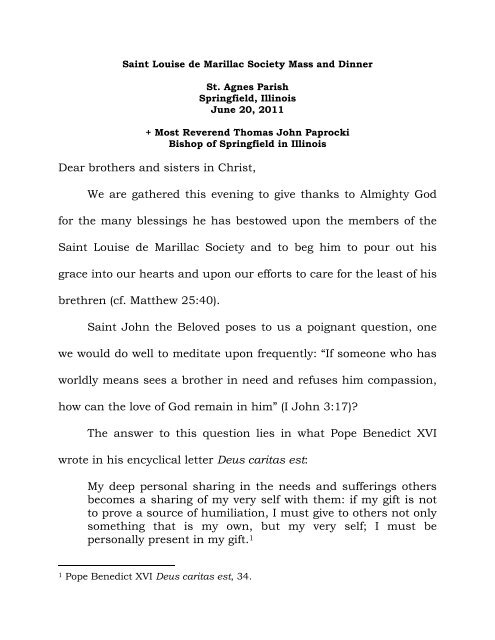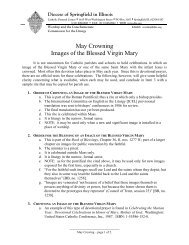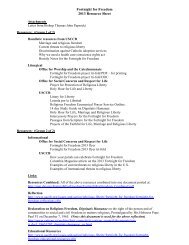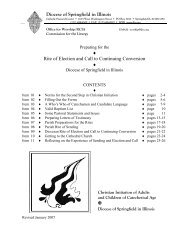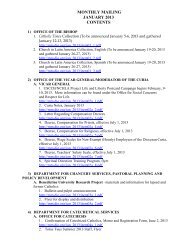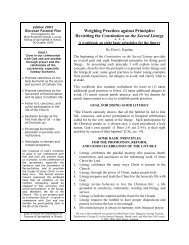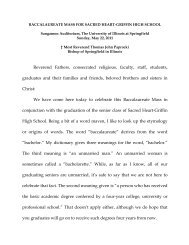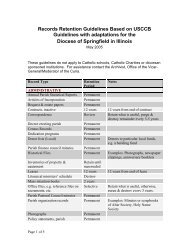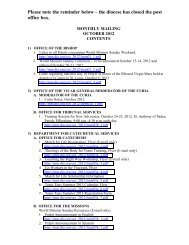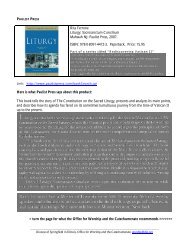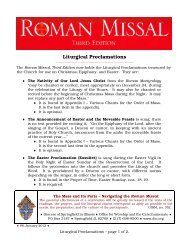June 20, 2011 - Saint Louise de Marillac Society Mass and Dinner
June 20, 2011 - Saint Louise de Marillac Society Mass and Dinner
June 20, 2011 - Saint Louise de Marillac Society Mass and Dinner
- No tags were found...
You also want an ePaper? Increase the reach of your titles
YUMPU automatically turns print PDFs into web optimized ePapers that Google loves.
<strong>Saint</strong> <strong>Louise</strong> <strong>de</strong> <strong>Marillac</strong> <strong>Society</strong> <strong>Mass</strong> <strong>and</strong> <strong>Dinner</strong>St. Agnes ParishSpringfield, Illinois<strong>June</strong> <strong>20</strong>, <strong>20</strong>11+ Most Reverend Thomas John PaprockiBishop of Springfield in IllinoisDear brothers <strong>and</strong> sisters in Christ,We are gathered this evening to give thanks to Almighty Godfor the many blessings he has bestowed upon the members of the<strong>Saint</strong> <strong>Louise</strong> <strong>de</strong> <strong>Marillac</strong> <strong>Society</strong> <strong>and</strong> to beg him to pour out hisgrace into our hearts <strong>and</strong> upon our efforts to care for the least of hisbrethren (cf. Matthew 25:40).<strong>Saint</strong> John the Beloved poses to us a poignant question, onewe would do well to meditate upon frequently: “If someone who hasworldly means sees a brother in need <strong>and</strong> refuses him compassion,how can the love of God remain in him” (I John 3:17)?The answer to this question lies in what Pope Benedict XVIwrote in his encyclical letter Deus caritas est:My <strong>de</strong>ep personal sharing in the needs <strong>and</strong> sufferings othersbecomes a sharing of my very self with them: if my gift is notto prove a source of humiliation, I must give to others not onlysomething that is my own, but my very self; I must bepersonally present in my gift. 11 Pope Benedict XVI Deus caritas est, 34.
2In your patroness we see one in whom the love of the Father wasin<strong>de</strong>ed present <strong>and</strong> one who could rightly say, with <strong>Saint</strong> John, “Weknow that we have passed from <strong>de</strong>ath to life because we love ourbrothers” (I John 3:14). In the life of <strong>Saint</strong> <strong>Louise</strong> <strong>de</strong> <strong>Marillac</strong>, wesee one who, in the end, gave her very self.The life of <strong>Saint</strong> <strong>Louise</strong> <strong>de</strong> <strong>Marillac</strong> is one marked with bothgreat struggles <strong>and</strong> great joys; in this, her life is much like our ownlives. From a young age, she wanted to be a nun, but her poorhealth prevented her from entering the consecrated life. When herfather died in 1604 she was sent to live with a poor spinster to learnwhat was then consi<strong>de</strong>red proper for a woman to know. In 1613,she married the secretary of the household of the queen, Antoine LeGras, who held a position that seemed to her family neither too lownor too high.Her marriage brought her some happiness <strong>and</strong> alsoa son, who showed himself to be unstable. Her husb<strong>and</strong> lost hisposition <strong>and</strong> his status when the queen was banished <strong>and</strong> foundwork managing the estate of the d’Attichy children, whose parentshad recently died. Eventually, he forfeited his own estate to thed’Attichy’s <strong>and</strong> fell terminally ill.
3At this point, <strong>Louise</strong> struggled greatly in the interior life. Shewas tempted to leave her husb<strong>and</strong>, could not believe in theimmortality of her soul <strong>and</strong> even doubted the existence of God.She found no consolation in the advice of her spiritual director<strong>and</strong> entrusted herself to the prayers of <strong>Saint</strong> Francis <strong>de</strong> Sales, whodied the previous year. In 1623, on the Solemnity of Pentecost, shefound herself freed of her spiritual struggle <strong>and</strong> knew that shewould take vows in the future, as she long <strong>de</strong>sired to do, but firstshe nee<strong>de</strong>d to attend to her husb<strong>and</strong>, for whom she cared for thenext two years. She also knew that a spiritual director would besent to her who would help her grow in faith, hope <strong>and</strong> love.When her husb<strong>and</strong> died, <strong>Louise</strong> vowed to remain a widow <strong>and</strong>also took the vows of poverty, chastity <strong>and</strong> obedience. She thenwaited two more years for <strong>Saint</strong> Vincent <strong>de</strong> Paul to become herspiritual director, who told her in these interim years, “Go patiently,go pru<strong>de</strong>ntly <strong>and</strong> be as happy as you can.” 2 Her many strugglesseem to have given her a heavy heart.2 This <strong>and</strong> subsequent quotations from <strong>Saint</strong> Vincent <strong>de</strong> Paul <strong>and</strong> <strong>Saint</strong> <strong>Louise</strong><strong>de</strong> <strong>Marillac</strong> are taken from Butler’s Lives of the <strong>Saint</strong>s: New Full Edition:March, Teresa Rodriguez et al, eds. (Collegeville, Minnesota: TheLiturgical Press, 1999), 150-155.
4When <strong>Louise</strong> asked to assist in the work of Vincent’s MissionPriests, he placed her in charge of the Ladies of Charity heestablished in various parishes, whose zeal was faltering in hisabsence. As her first task, she was to investigate the quality of thework of the Ladies of Charity, a task which took her four years <strong>and</strong>which changed her greatly. Her melancholy lifted, <strong>de</strong>spite hercontinuous interaction in tragic <strong>and</strong> <strong>de</strong>plorable situations; sheretook her mai<strong>de</strong>n name; <strong>and</strong> she became a woman filled with joy.Vincent said to her, “God alone knows, Ma<strong>de</strong>moiselle, what he hasdone for me in giving you to me; in heaven you will know!”Together, <strong>Louise</strong> <strong>and</strong> Vincent realized that a new form of lifewas nee<strong>de</strong>d to assist the poor <strong>and</strong> alleviate their needs. The customof many of the Ladies of Charity to send their maids to wash thesick, mend their wounds <strong>and</strong> give them food was unacceptable; theLadies must themselves perform these works of charity.These women were not to be known as Religious, living in aconvent <strong>and</strong> cloistered from the world, but were to live among thepoor, making their home with them. As Vincent said, “The objectiveof the Sister of Charity is the comfort <strong>and</strong> salvation of herneighbor.”
Toward the end of her life it was clear <strong>Louise</strong> had advancedwell in the spiritual life because of her work with the Company ofSisters. She said,When we are set free from all attachment to this world <strong>and</strong> tothe senses, from all attachment to our own self-love <strong>and</strong> ourown free will <strong>and</strong> even from attachment to our <strong>de</strong>light inChrist <strong>and</strong> in his presence, when we have created a completevoid within ourselves, the Holy Spirit will come into it <strong>and</strong>make us live with a divine life.She learned to entrust herself entirely to the Lord <strong>and</strong> <strong>de</strong>sired to beone with Christ crucified. Her only <strong>de</strong>sire was “to be completelyextinguished through the annihilation of my whole inner life,” <strong>and</strong>on her <strong>de</strong>athbed she said, “No <strong>de</strong>sires, no resolutions. The grace ofmy God will accomplish in me whatever he wills.” She passed from<strong>de</strong>ath to life because she loved her brothers <strong>and</strong> sisters in poverty<strong>and</strong> in need.She could only say this because in her works of charity shegave away her very self; she imitated the love of Jesus Christ. Shecould say, “No <strong>de</strong>sires, no resolutions,” because she came to realizethatThere are times when the bur<strong>de</strong>n of need <strong>and</strong> our ownlimitations might tempt us to become discouraged. Butprecisely then we are helped by the knowledge that, in theend, we are only instruments in the Lord’s h<strong>and</strong>s; <strong>and</strong> this5
knowledge frees us from the presumption of thinking that wealone are personally responsible for building a better world. Inall humility we will do what can, <strong>and</strong> in all humility we willentrust the rest to the Lord. It is God who governs the world,not we. We offer him our service only to the extent that wecan, <strong>and</strong> for as long as he grants us the strength. To do all wecan with what strength we have, however, is the task whichkeeps the good servant of Jesus Christ always at work: “Thelove of Christ urges us on” (II Corinthians 5:14). 3The example of her life shows us the beauty <strong>and</strong> the happiness ofab<strong>and</strong>oning ourselves into the loving h<strong>and</strong>s of Jesus Christ <strong>and</strong>allowing him to use us as he sees fit. Her life reminds us that onlyin heaven will see what good the Lord will work through us.My <strong>de</strong>ar friends, through your involvement in the <strong>Saint</strong> <strong>Louise</strong><strong>de</strong> <strong>Marillac</strong> <strong>Society</strong>, you show that you un<strong>de</strong>rst<strong>and</strong> <strong>and</strong> believe thatthe “love of neighbor, groun<strong>de</strong>d in the love of God, is first <strong>and</strong>foremost a responsibility for each individual member of thefaithful.” 4 In<strong>de</strong>ed, “for the Church, charity is not a kind of welfareactivity which could equally be left to others, but is a part of hernature, an indispensible expression of her very being.” 5For your generous <strong>and</strong> loving assistance in this vital aspect ofthe Church’s mission, I am <strong>de</strong>eply grateful. Your <strong>de</strong>ep concern for63 Pope Benedict XVI, Ibid., 35.4 Ibid., <strong>20</strong>.5 Ibid., 25a.
7children who need foster homes or who have been placed foradoption manifests your genuine love of Jesus Christ who ma<strong>de</strong>himself small at Bethlehem.Through the example <strong>and</strong> intercession of <strong>Saint</strong> <strong>Louise</strong> <strong>de</strong><strong>Marillac</strong>, may your efforts bear great fruit in the lives of the poor<strong>and</strong> help them to realize the great love God has for them. Strivedaily to give your very selves in your charity that you may hearJesus say to you, “Come, you who are blessed my Father. Inheritthe kingdom prepared for you from the foundation of the world”(Matthew 25:34).May God give us this grace. Amen.


